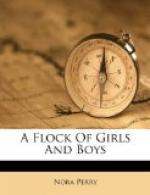“What! you can tell me where this etching is? You can take me to it?” he exclaimed, with a sort of joyful incredulity.
Laura answered by turning to Esther and saying. “This young lady can tell you more about it. The etching is in the possession of her family.”
“Ah, and this young lady is—”
Laura reached back, seized Esther’s hand, and pulled her to her side.
“Is Miss Bodn.”
“Mees Bodn!” he repeated with a start. “Mees Bodn! Ah, pardon me, do you spell this name B-o-w-d-o-i-n?”
“You do, you do,” as Esther answered in the affirmative; “and, pardon again, are you related to one Henri—Henry, you call it here—Henry Pierre Bowdoin?”
“My father’s name was Henry Pierre Bowdoin.”
“Then, Mademoiselle,” and Monsieur Baudouin stretched out his hand, and a smile lit up his face, “you must be a relation of mine; and three years ago, when I was in this country, and tried to find the American branch of our family that spelled its name Bowdoin and was called Bodn, but which was originally Baudouin, the old Huguenot name, I was told it had died out. Where were you then, Mademoiselle?”
“In Munich, where my mother and I had lived with my uncle John Wybern, since my father’s death, years ago.”
“Your uncle! John Wybern was your uncle? So—so is it possible, is it possible? And I find the two objects I have been hunting, so far apart, together! It is most astonishing and yet most simple. And your mother—your mother is living? Yes, and you will give me your address, that I may hasten to pay my respects to her;” and Monsieur whipped out a little note-book and wrote down, probably with greater satisfaction than it had ever been written before, “McVane Street.”
“Most astonishing and yet most simple,” as Monsieur had truly said; yet to the flock of Miss Milwood’s girls, who, well down to the front, had lost nothing of this surprising interview, it was only “most astonishing,” and to some of them most humiliating and mortifying. Kitty Grant was the first to voice this mortification, by turning upon them and saying, as Esther disappeared with Monsieur Baudouin, “Say, girls, how do you feel now? I feel like one of Cinderella’s sisters. Laura now—Laura, where are you?” But Laura had also disappeared. She wanted to be by herself and think it over. But what of Esther,—Esther, who had been neglected and disregarded and despised? What of Esther, as she stood there, and as she walked away with Monsieur Baudouin? Esther was the least astonished of them all, for years ago she had been familiar with the facts of her paternal family history, and knew that she was a descendant of Pierre Baudouin, a French Huguenot, who had fled to America to escape religious persecution, and knew that the name Baudouin had suffered a change to Bowdoin; knew, too, that as Bowdoin it had been made illustrious in America’s annals,




